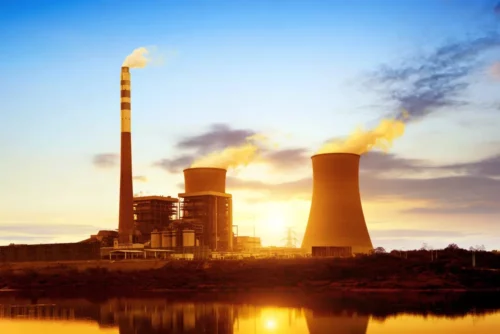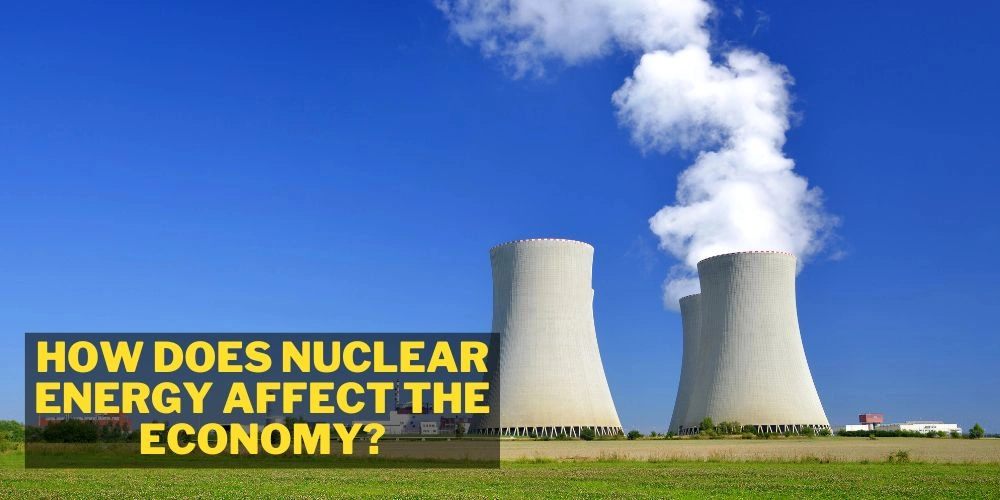Nuclear energy plays a significant role in powering economies worldwide. It generates electricity on a large scale while offering unique economic advantages.
However, it also comes with challenges that impact its overall contribution. Understanding the economic effects of nuclear energy helps clarify its role in global energy systems.
This article explores how does nuclear energy affect the economy, covering its benefits, challenges, and future prospects.
What is Nuclear Energy?
Nuclear energy is a form of power generated through nuclear reactions. The most common method is nuclear fission, where atoms are split to release energy.
Nuclear fusion, another method, involves combining atoms to produce energy, though it is still in the experimental stage.
Globally, nuclear energy contributes about 10% of electricity production. Countries like the United States, France, and China rely heavily on nuclear power to meet their energy needs.
Its ability to provide consistent and large-scale electricity makes it an essential part of many national grids.
Economic Benefits of Nuclear Energy
Nuclear energy offers several economic benefits. One of the most significant advantages is its low operational costs.
Once a nuclear power plant is built and running, it can produce electricity at a relatively low cost compared to fossil fuels. This makes it a cost-effective option for meeting long-term energy demands.
Another benefit is the job creation associated with nuclear energy. Building and operating nuclear power plants require skilled labor, creating jobs in engineering, construction, and maintenance. For example, the U.S. nuclear energy sector employs thousands of workers, contributing to local economies.

Nuclear energy also promotes energy independence. By reducing the need for imported fossil fuels, countries can stabilize their economies and avoid price fluctuations. This is particularly important for nations with limited natural resources.
Additionally, nuclear power provides long-term energy security. Unlike renewable sources like solar and wind, which depend on weather conditions, nuclear energy offers a steady and reliable supply.
Challenges and Economic Drawbacks of Nuclear Energy
Despite its benefits, nuclear energy has economic challenges. The most notable is the high initial cost of building nuclear power plants.
Construction projects require significant investment, often running into billions of dollars. These costs can deter governments and private companies from pursuing nuclear projects.
Managing nuclear waste is another economic burden. Radioactive waste needs to be stored safely for thousands of years, requiring secure facilities and ongoing monitoring. These measures add to the long-term costs of nuclear energy production.
Decommissioning old nuclear power plants also impacts the economy. Shutting down a plant involves dismantling equipment, managing waste, and restoring the site. These processes are expensive and time-consuming, often stretching over decades.
The risk of accidents further adds to the economic drawbacks. Incidents like Chernobyl and Fukushima caused significant financial losses, both in terms of cleanup costs and economic disruption. They also led to stricter regulations, which increased the cost of operating nuclear power plants.
How Does Nuclear Energy Affect the Economy?
Nuclear energy supports economic growth in several ways. Its reliable energy supply drives industrial development.
Manufacturing and heavy industries require consistent electricity to operate efficiently. Nuclear power ensures that these sectors can meet their energy needs without interruptions.
In many cases, nuclear power plants contribute to regional development. They are often built in rural or less-developed areas, providing jobs and boosting local economies.
The infrastructure and services required to support these plants also stimulate economic activity in surrounding regions.
Exporting nuclear technology offers another economic advantage. Countries with advanced nuclear programs can export reactors, expertise, and related services. This creates revenue and strengthens international trade relationships.
Nuclear Energy and Environmental Economics
Nuclear energy has economic implications for environmental sustainability. One key benefit is its ability to reduce carbon emissions.
Unlike coal or gas, nuclear power generates electricity without releasing greenhouse gases. This contributes to cost savings associated with climate change mitigation.

Nuclear energy also complements renewable sources like wind and solar. While renewables are intermittent, nuclear power provides a stable supply, balancing the grid. This synergy supports economic sustainability by ensuring a reliable energy mix.
Future Economic Prospects of Nuclear Energy
Advances in technology are shaping the future of nuclear energy. Small modular reactors (SMRs) are being developed to make nuclear power more accessible and cost-effective. These reactors require less upfront investment and can be deployed in smaller regions.
Government policies and subsidies play a significant role in the economic viability of nuclear energy.
Incentives for clean energy development encourage investment in nuclear projects. Countries prioritizing nuclear energy are likely to see growth in their energy sectors.
Emerging markets are also investing in nuclear power. Nations like India and the United Arab Emirates are building new plants to meet their growing energy demands.
These developments highlight the potential for nuclear energy to contribute to global economic growth.
Conclusion
Nuclear energy has a profound impact on the economy. It provides low-cost, reliable electricity while creating jobs and promoting energy independence.
However, it also faces challenges, including high construction costs and waste management. Advances in technology and supportive policies are making nuclear power more economically viable.
By understanding the benefits and limitations of nuclear energy, policymakers and stakeholders can make informed decisions. Its role in driving economic growth and supporting sustainable energy systems cannot be overlooked.


 Tags:
Tags:










